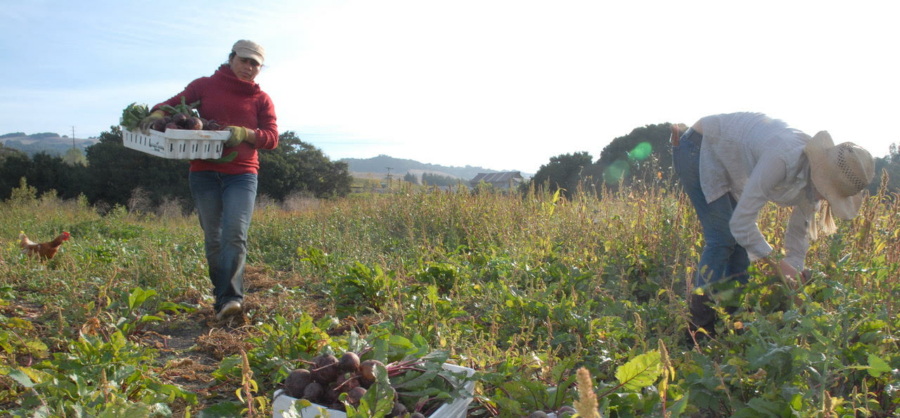On June 29, 2022, the Natural Carbon Sequestration and Resilience Act (AB 2649, C. Garcia) passed out of the California Senate Environmental Quality Committee by a vote of five to two. AB 2649 will make California the first state in the nation to set statutory goals for naturally removing past climate pollution from the atmosphere, while also making the state more resilient to heat extremes, drought, wildfires, and other climate impacts. You can also read more about the bill and find other relevant documents here.
The following is a transcript of testimony given to the Committee by The Climate Center’s Vincent Wiraatmadja and the Carbon Cycle Institute’s Dr. Jeff Creque.
Testimony from Vincent Wiraatmadja, Government Affairs Manager, The Climate Center:
Good morning, Chair Allen and committee members. My name is Vincent Wiraatmadja, Government Affairs Manager for The Climate Center. I am honored to testify in support of AB 2649 and am grateful to Assemblymember Garcia for championing this bill.
Recent climate science reports from the UN are clear. The window of opportunity to secure a livable future is quickly closing. We must cut fossil fuel use in half by 2030, while also removing the huge amounts of carbon that we’ve already put into our atmosphere if we’re to have a shot at securing a stable climate.
To remove that legacy climate pollution, the state must rapidly scale up proven, cost-effective practices for natural carbon sequestration — such as applying compost and planting cover crops on agricultural soils, restoring riparian habitat and coastal wetlands, managing for mature forest structure, and greening our cities.
AB 2649 will set urgently needed and achievable state goals for naturally accruing carbon in soil and vegetation over the long term, ensuring that as carbon cycles through natural systems, it accumulates in vegetation and soil over years, decades, and longer, while the amount returning to the atmosphere from these systems is reduced.
We cannot rely on technological direct air capture (DAC), which is in its infancy, very expensive, and not yet scalable. Only natural carbon accrual can cost-effectively draw down previous carbon emissions at scale in this decade, while also increasing resilience to growing climate extremes and providing multiple co-benefits for our health, environment, and economy.
The bill is supported by 80 organizations, including CivicWell (formerly the Local Government Commission), who asked us to convey their support for the bill. We urge your aye vote on the Natural Carbon Sequestration and Resilience Act, which is essential for securing a healthy, climate-safe future for all.
Testimony from Jeff Creque, PhD, Director of Rangeland and Agroecosystem Management, Carbon Cycle Institute:
Good morning, Chair Allen and committee members. I’m Dr. Jeff Creque, Director at the Carbon Cycle Institute, which is a co-sponsor of AB 2649. I hold a doctorate in Rangeland Ecology, I am a USDA-certified Conservation Planner, I have worked with scores of farmers across California, and I farmed in Marin County for 35 years.
As much as one-third of the excess carbon dioxide in the atmosphere is the direct result of mismanagement of the world’s natural and working lands. We must urgently set — and meet — ambitious goals for the transfer of that excess carbon dioxide back into terrestrial and aquatic ecosystems.
To protect and restore California’s biodiversity, our water, salmon, forests, rangeland watersheds, agricultural soils, our natural resource-based economic activity, and the health of our communities, we must engage our natural and working lands to recapture as much of that lost carbon dioxide as quickly as possible. In the process, we will enhance the air, water, and food quality of our communities and their resilience to climate change.
AB2649 does not define the means to meet these goals but proposes a process to define those means. We emphasize that all actions under the terms of the bill are voluntary, as only willing engagement of the natural and working lands sector can achieve the ambitious goals of the legislation.
The state has identified the need for 100 new compost facilities to meet the legislative requirements of SB 1383. Compost is a potent strategy, but only one of many, to increase soil organic carbon long term.
We rose to the challenge of the Dust Bowl by creating the Soil Conservation Service, the Civilian Conservation Corps, and the County Conservation Districts. That infrastructure still exists. With adequate state support — including a greatly expanded, well-trained workforce and strong financial and technical support for our tens of thousands of land managers across the state — we can meet this new, much greater, challenge.
AB 2649 sets an ambitious yet essential and realizable target for terrestrial carbon sequestration in California. We urge your aye vote. Thank you.


